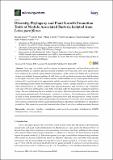Por favor, use este identificador para citar o enlazar a este item:
http://hdl.handle.net/10261/209465COMPARTIR / EXPORTAR:
 SHARE SHARE
 CORE
BASE CORE
BASE
|
|
| Visualizar otros formatos: MARC | Dublin Core | RDF | ORE | MODS | METS | DIDL | DATACITE | |

| Campo DC | Valor | Lengua/Idioma |
|---|---|---|
| dc.contributor.author | Soares, Ricardo | - |
| dc.contributor.author | Trejo, Jesús | - |
| dc.contributor.author | Lorite, María J. | - |
| dc.contributor.author | Figueira, Etelvina | - |
| dc.contributor.author | Sanjuán, Juan | - |
| dc.contributor.author | Videira e Castro, Isabel | - |
| dc.date.accessioned | 2020-04-28T14:07:14Z | - |
| dc.date.available | 2020-04-28T14:07:14Z | - |
| dc.date.issued | 2020-03-31 | - |
| dc.identifier.citation | Microorganisms 8(4): 499 (2020) | - |
| dc.identifier.issn | 2076-2607 | - |
| dc.identifier.uri | http://hdl.handle.net/10261/209465 | - |
| dc.description | © 2020 by the authors. | - |
| dc.description.abstract | Lotus spp. are widely used as a forage to improve pastures, and inoculation with elite rhizobial strains is a common practice in many countries. However, only a few Lotus species have been studied in the context of plant-rhizobia interactions. In this study, forty highly diverse bacterial strains were isolated from root nodules of wild Lotus parviflorus plants growing in two field locations in Portugal. However, only 10% of these isolates could nodulate one or more legume hosts tested, whereas 90% were thought to be opportunistic nodule associated bacteria. Phylogenetic studies place the nodulating isolates within the Bradyrhizobium genus, which is closely related to B. canariense and other Bradyrhizobium sp. strains isolated from genistoid legumes and Ornithopus spp. Symbiotic nodC and nifH gene phylogenies were fully consistent with the taxonomic assignment and host range. The non-nodulating bacteria isolated were alpha- (Rhizobium/Agrobacterium), beta- (Massilia) and gamma-proteobacteria (Pseudomonas, Lysobacter, Luteibacter, Stenotrophomonas and Rahnella), as well as some bacteroidetes from genera Sphingobacterium and Mucilaginibacter. Some of these nodule-associated bacteria expressed plant growth promotion (PGP) traits, such as production of lytic enzymes, antagonistic activity against phytopathogens, phosphate solubilization, or siderophore production. This argues for a potential beneficial role of these L. parviflorus nodule-associated bacteria. | - |
| dc.description.sponsorship | Financial support was given by the projects PRODER, PA 54970 and ALT20-45-2015-08. | - |
| dc.publisher | Multidisciplinary Digital Publishing Institute | - |
| dc.relation.isversionof | Publisher's version | - |
| dc.rights | openAccess | - |
| dc.subject | Diversity | - |
| dc.subject | Rhizobia | - |
| dc.subject | Endophytes | - |
| dc.subject | Plant growth promoting rhizobacteria (PGPR) | - |
| dc.subject | Bradyrhizobium | - |
| dc.subject | Lotus parviflorus | - |
| dc.title | Diversity, Phylogeny and Plant Growth Promotion Traits of Nodule Associated Bacteria Isolated from Lotus parviflorus | - |
| dc.type | artículo | - |
| dc.identifier.doi | 10.3390/microorganisms8040499 | - |
| dc.description.peerreviewed | Peer reviewed | - |
| dc.relation.publisherversion | https://doi.org/10.3390/microorganisms8040499 | - |
| dc.identifier.e-issn | 2076-2607 | - |
| dc.date.updated | 2020-04-28T14:07:14Z | - |
| dc.rights.license | http://creativecommons.org/licenses/by/4.0/ | - |
| dc.relation.csic | Sí | - |
| dc.identifier.pmid | 32244524 | - |
| dc.type.coar | http://purl.org/coar/resource_type/c_6501 | es_ES |
| item.fulltext | With Fulltext | - |
| item.openairecristype | http://purl.org/coar/resource_type/c_18cf | - |
| item.openairetype | artículo | - |
| item.cerifentitytype | Publications | - |
| item.grantfulltext | open | - |
| Aparece en las colecciones: | (EEZ) Artículos | |
Ficheros en este ítem:
| Fichero | Descripción | Tamaño | Formato | |
|---|---|---|---|---|
| microorganisms-08-00499.pdf | 4,9 MB | Adobe PDF |  Visualizar/Abrir |
CORE Recommender
PubMed Central
Citations
10
checked on 17-abr-2024
SCOPUSTM
Citations
20
checked on 15-abr-2024
WEB OF SCIENCETM
Citations
17
checked on 22-feb-2024
Page view(s)
142
checked on 24-abr-2024
Download(s)
129
checked on 24-abr-2024

